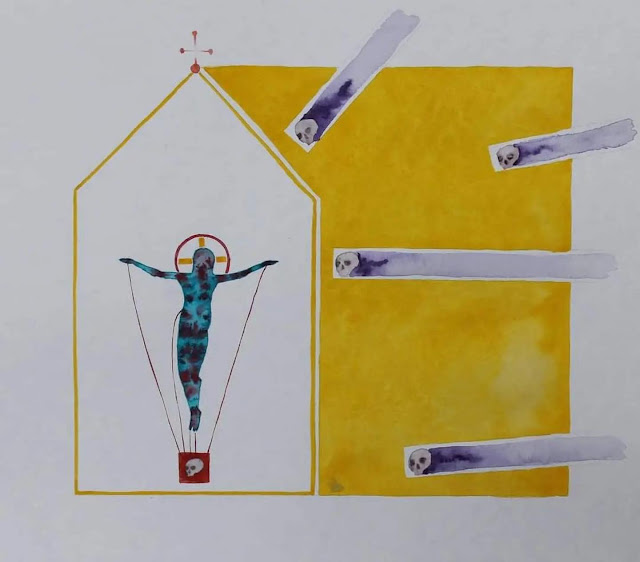The western Ukrainian city of Lviv is
home to the Lviv School of Iconographers, a collective of women and men who are
keeping alive deep-rooted traditions, not by slavishly reproducing past forms
but by labouring with the Holy Spirit to birth twenty-first-century
descendants.
This icon of the ‘Nativity’ is by
Lyuba Yatskiv. It may seem strange to gaze upon an icon of the Nativity in
Lent, as we prepare to celebrate Easter, but the mother and child are framed by
the bread and wine: the Incarnation and the Passion are apiece.
At the centre of the icon, a mother
and her child.
She might be Mary of Mariupol, her
child, wrapped in bandages and lying in a cot or an incubator.
Or she might be a Russian mother,
receiving back the body of her son for burial.
The Christ-child, born as one of us, and
sharing our death. His eyes meet ours, hold our gaze.
We hold before God all mothers caught
in the conflict zones of our world, and their children.
Lord, in your mercy, hear our prayer.
Mary, Mother of God, pray for your
sons and daughters.
Above the mother and child, hiding them
under their wings, the angels look on, in wonder. And as we lift these mothers
and children before God, we pray that they may be shielded from harm; we pray that
messages of hope would reach those who live in fear or despair this night.
Lord, in your mercy, hear our prayer.
At the bottom of the icon, the South
of its Compass, St Joseph, pensive. In his face we see all that he knows lies
ahead, and all that he knows he cannot know. We hold before God our hopes and
fears, the limits of our knowledge and foreknowledge. Our vulnerability,
frustration, shame, our hope, faith, love.
Lord, in your mercy, hear our prayer.
To the East of Joseph, we see the
shepherds: youth, maturity, old age. We see the grandparents, leaving their
homeland behind, not knowing when or if they will see home again. We see the
fathers, shepherding their families to the border and then leaving them there,
returning home, to fight. We see the children, carrying their dogs, cradling
their pets, holding on to loyal love. We note the human instinct to protect the
innocent from harm. And, lifting our eyes to the Christ wrapped in his borrowed
manger and his borrowed tomb, we acknowledge our limitations, that we cannot
protect those we love from harm. We hold our limitations and our frustration
before God.
Lord, in your mercy, hear our prayer.
To Joseph’s West, we see the Magi: on
their difficult journey, bringing their gifts, an outpouring of heart and mind
and soul and strength. We see ourselves, our human desire to respond, to
gather-up and transport items, practical and symbolic in nature, and to send
money, to offer up our resources, perhaps to open our homes. And we recall that
the journey of the Magi did not reach the right people, or only indirectly, and
that their coming resulted in unintended harm. We pray that God would receive
our offerings and keep them from resulting in greater sorrow.
Lord, in your mercy, hear our prayer.
Gazing upon the bread and the wine,
we pray for the Communion of the Saints, joining with our sisters and brothers
in Ukraine and Russia, in Poland and the surrounding nations, all around the
world, and with those who have gone before us, who see God now more clearly. Lord,
make us one, as you are one.
Lord, in your mercy, hear our prayer.
Gazing upon the cattle, we pray for
the nations of the world, that they would return to peace and security, to
gentleness and productivity, to working alongside one another for equity and
justice.
Lord, in your mercy, hear our prayer.
Gazing upon the vine, fresh growth
from the stump cut down, we pray for the restoration of cities, neighbourhoods,
destroyed, for the renewing of communities, for the remnant who will return to
rebuild.
Lord, in your mercy, hear our prayer.
Gazing upon the Sun, blazing forth, we
pray that in the tender compassion of our God the dawn from on high shall break
upon us, to shine on those who dwell in darkness and the shadow of death, and
to guide our feet into the way of peace.
Lord, in your mercy, hear our prayer.




























